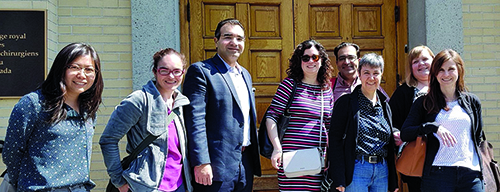Fall 2019 (Volume 29, Number 3)
Perspectives on Recent Changes in Medical Education in Rheumatology
By Trudy Taylor, MD, FRCPC
Download PDF
As I reflect on my experiences in medical education, I am struck by the incredibly supportive community of teachers and educators we have in our specialty. Rheumatologists, for the most part, have a natural affinity for teaching and never seem to shy away from sharing our knowledge and passion for our field.
I have been fortunate enough to have strong medical education mentors within the rheumatology community, locally and nationally, who have helped shape my teaching philosophy and given me opportunities to get involved in medical education at all levels of training. These days, I am most heavily involved with postgraduate medical education, first as a recently retired program director, and now as the newly minted chair of the Royal College Specialty Committee for Rheumatology.
The biggest change in medical education in my career has been the advent of competency-based medical education (CBME). On July 1 of this year, rheumatology residency training programs across the country made the switch from the traditional time-based approach to medical education to a focus on demonstrating competence in the core tasks of our discipline. Although this change may seem abrupt, rest assured that there were many years of learning and planning that led to this change. Members of the rheumatology specialty committee at the Royal College, including all rheumatology program directors as well as voting members from each region, spent many hours learning about Competency by Design (CBD), culminating in three three-day workshops over one year to hash out the competencies that are core to our specialty.
What will this change mean to you as a rheumatologist who may have residents join you in your clinical practice? You may be asked to assess a particular activity that is core to the practice of rheumatology, an “Entrustable Professional Activity” (EPA) in CBD lingo. The assessments are short and meant to occur in real clinical settings. They are a great way to help us, as teachers and educators, to focus our assessment and feedback.
As with any change, there will be growing pains with the implementation of CBD. However, I can attest that now is an exciting time to be a medical teacher, when we have tools that enable us to focus our feedback and provide valuable teaching to the future leaders of our great discipline.

Members of the Royal College Rheumatology Specialty Committee as they leave the Royal College building in Ottawa in May 2019. Pictured from left
to right: Dr. Carrie Ye, Dr. Edith Villeneuve, Ahmad Zbib (CEO of the CRA), Dr. Sarah Campillo, Dr. Raheem Kherani, Dr. Rosie Scuccimarri, Dr. Trudy Taylor,
and Dr. Elana Murphy.
Trudy Taylor, MD, FRCPC
Associate Professor,
Division of Rheumatology,
Department of Medicine,
Division of Medical Education,
Dalhousie University
Halifax, Nova Scotia
|
